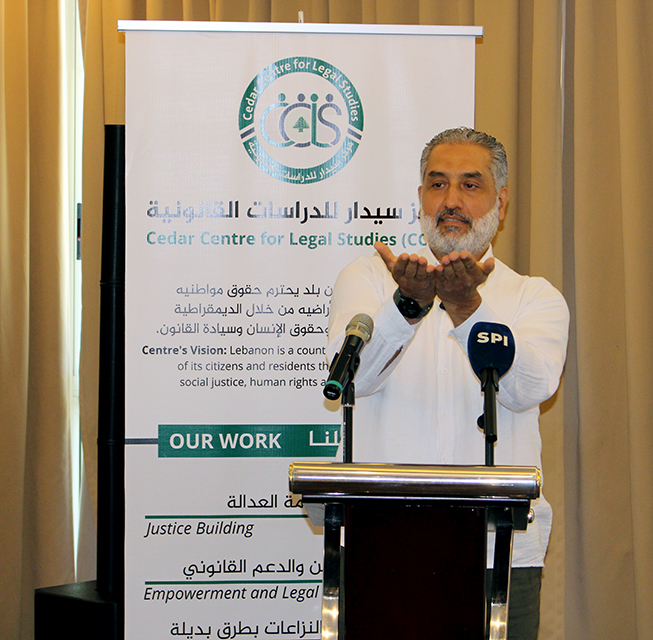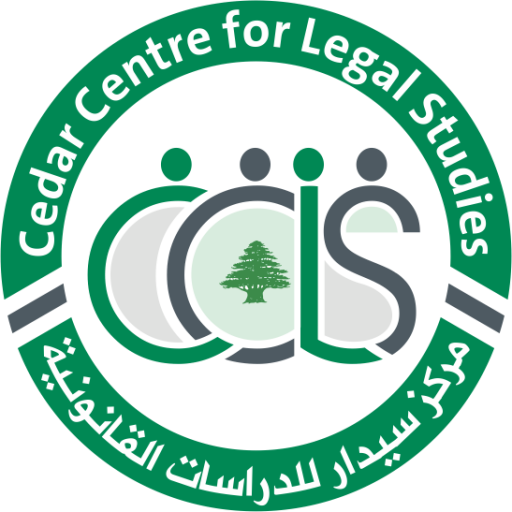Cedar Centre For Legal Studies
Case Title
Moaz Mourab: From the "Human Slaughterhouse" to the Kitchen… A Story of Returning to Life Through Hope
07/01/2025

One day in 2024, a taxi stopped on the outskirts of Tripoli, northern Lebanon. Out stepped a weary man in his fifties, his face drawn, his eyes drifting between a haunting past and an unfamiliar present. This was Moaz Mourab, returning to his hometown after 18 years spent in Syrian prisons—years of torture and solitary confinement, without trial, without a documented charge, arrested simply for crossing from Iraq to Lebanon during a politically turbulent time.
“All I wanted when I got out of prison after the regime fell was to run and kiss the asphalt.”
From Journalism to Prison
Moaz was in his early 30s when he left Tripoli in 2003, heading to Iraq, driven by the horror of the American invasion and driven by Arab enthusiasm and national belonging. He wasn’t affiliated with any party or movement—he worked as a freelance journalist, documenting the destruction of a fellow Arab country. After three years, he decided to return to Lebanon through Syria. That journey quickly turned into a nightmare when Syrian intelligence forces arrested him in Douma, accusing him—without evidence—of belonging to a “religious terrorist organization”.
A Journey of Torture: From the Palestine Branch to Saydnaya
He was first transferred to the State Security Branch in Kafr Sousa, then to the notorious Palestine Branch, where he was introduced to a new reality—or more precisely, to the absence of one. There, he endured his first rounds of torture: hanging by the wrists, electric cables, forced nudity, sectarian slurs, and unspeakable insults.
“Sometimes they tortured us just for fun.”
Then came the worst phase: he was sent to Saydnaya Military Prison—dubbed the “human slaughterhouse”—where he spent several years before being moved to Adra Prison.
“The torture varied by prison and happened in phases. Each place had its own method. I experienced the full range—from Saydnaya to Adra.”
“I still suffer from involuntary muscle spasms in my sleep, in my jaw and legs, due to the fear I lived through. In Saydnaya, death was a part of daily life, and the torture methods defied the imagination.”
Returning to Tripoli… and the Feeling of Alienation
His family welcomed him back with ululations and tears, but he felt estranged from his city. He had left as a 33-year-old man and returned at 51. He had left his children as toddlers, and now his daughter Maryam was a married mother, his son Mohammad had graduated from university. His mother, who had clung to hope all those years, could barely believe he was truly home.
“After 18 years, thank God. I returned to my country, my family, my people. I saw my children again and was stunned at how much they’d grown. My son is a university student, my daughter is married and I’m now a grandfather. The pain hasn’t gone away—I need time to heal. But thankfully, it’s begun to fade now that I realize I’m safe and surrounded by those I love.”
A Turning Point: Cedar Center for the Rehabilitation of Torture Survivors
Amid his confusion, the Cedar Center for the Rehabilitation for the victims of Torture reached out to him—something he hadn’t expected. Someone actually understood what he’d been through.
“The center intervened right away and offered services to help me reintegrate into society and reconnect with my family and everyday life.”
“The center provided all available services promptly, transparently, and confidentially—from psychosocial support to medical consultations, medication, and laboratory tests—alongside ongoing follow-up on my legal case. For people like us, survivors of prolonged torture, this center has been a true pillar of support. It represents a vital step forward in the rehabilitation of torture victims.
“It was my true source of support—emotionally, socially, psychologically, and legally. They shared in my pain and story, easing my suffering along the way. The entire team made me feel seen and cared for, as if my pain truly mattered to them. This center must be preserved and supported, so that survivors of torture can overcome their anguish and move toward healing.”
From Hell to the Kitchen: A Life Project
With this support, Moaz decided to reclaim his life. He launched a small kitchen project from his home, preparing traditional meals and delivering them to customers himself—meals made with skill and resilience.
“The services I received helped me reintegrate, to create something new for myself. I started a small home-based kitchen, cooking and delivering meals—including frozen ready dishes.
“The project was a new starting point in my life after the support I received from the Cedar Center for the Rehabilitation of Torture Victims. The initiative is still ongoing, even if at a modest pace.
A Message of Hope
Today, Moaz doesn’t claim full recovery. The pain remains, in his body and memory—but he’s rediscovering hope and believes the suffering was temporary.
“A person can’t live without hope. And hope needs motivators. Everyone needs to believe—first in God, then in themselves. We must understand that no matter how long the hardship, it is only a phase.”
Recommendations to the Lebanese Authorities
Moaz Mourab’s case is a stark reminder of the grave suffering endured by victims of enforced disappearance and torture in Syrian prisons. It underscores the Lebanese government’s responsibility to protect its citizens, both at home and abroad. The report offers these recommendations:
- Official recognition of the cases of victims returning from detention abroad as victims of torture and enforced disappearance, and ensuring their right to justice, compensation, and rehabilitation.
- Activate the national mechanisms outlined in Law No. 65/2017 and expand their scope to include Lebanese victims who were subjected to torture abroad.
- Support and fund rehabilitation centers like Cedar as part of Lebanon’s international obligations.
- Launch awareness and reintegration campaigns to reduce social stigma for returning survivors.
- Strengthen diplomatic and human rights efforts to follow up on the cases of Lebanese forcibly disappeared abroad and prevent future violations.
